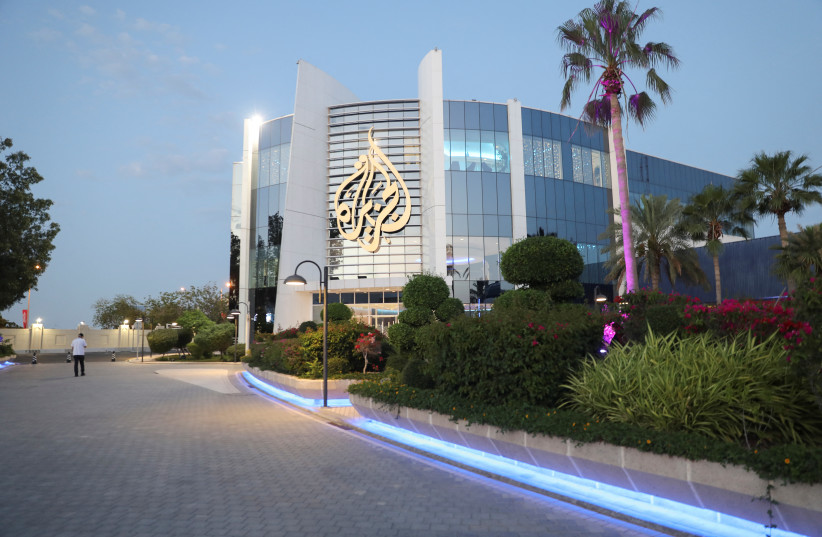Social media in the Arab world was rocked over the past week, after Al Jazeera Palestine, a subsidiary of Al Jazeera, posted a video of a Gazan doctor who claimed he was injured in Nuseirat during Operation Arnon to rescue the four hostages.
In the video, the doctor is seen crying and screaming about the casualties, saying: “It is true that we are steadfast;” but then the video suddenly cuts, and the man is seen crying again.
In a longer, uncut version of the video circulating online, the reason for the cutting and editing became clear. During his original speech, the man also said: “This rotten leadership will end up blaming us that we... it is true that we are steadfast, however, our leadership is scum. Our leadership got used to this bloodshed, may Allah reckon with them!... Swear to me that this video will reach the Palestinian leadership. This massacre at Nuseirat – we could have prevented it!”
It is unclear how the man meant for the so-called “massacre” to be prevented. Some speculated that he was referring to the fact that civilians from the area knew about the holding of hostages in their neighbors’ homes.

Silencing Palestinians criticizing Hamas
The video cut was not confirmed by Al Jazeera, but it would not be the first time the news outlet attempted to censor or silence Gazan criticism of Hamas. In November, a video circulated of an elderly wounded Gazan who was interviewed in a Gaza hospital by an Al Jazeera reporter.
“And regarding the resistance [Hamas], they hide among the people. Why do they hide among the people?” the wounded resident asked.
The reporter could then be seen immediately cutting the interview and trying to end the broadcast, leaving the interviewee surprised and attempting to get back to his interview.
In December, a different video showed an elderly woman interviewed by an Al Jazeera correspondent who tried to prompt her to admit that no aid is coming into Gaza. However, the elderly woman told him, “All aid goes down [underground to Hamas tunnels]and doesn’t reach the people.”
When the reporter tried to further push the pro-Hamas narrative, arguing that “people say that only a little aid gets in and is distributed,” the elderly lady wagged her finger at the reporter with a bitter smile, adding, “It all goes to their houses. Let Hamas take me or shoot me.”
The reporter proceeded to dismiss her opinion and go back to the camera.
On Thursday, the Tel Aviv District Court approved a request, put forth by Communications Minister Shlomo Karhi, to renew the temporary ban on Al Jazeera. In its ruling, the court cited evidence presented to it that proved the “severe and worrying impact of the content broadcast on the channel… [which] was the motive and incentive for the action of terrorists within the state” and that “Al Jazeera is perceived by the terrorist organization Hamas as its propaganda and intelligence arm.”
Al Jazeera’s reluctance to broadcast criticism of Hamas may be seen as part of this alliance between the Qatari mouthpiece and the terrorist group.
Social media and live broadcast as tools for criticism
LIVING IN a totalitarian regime that suppresses freedom of expression, many Gazans have been resorting to live broadcasts and social media as tools to introduce any criticism and contempt for Hamas that exists. Traditional media in Gaza, especially those affiliated with Hamas and its allies, don’t host such opinions.
In an early November broadcast, just as the Hamas-run Interior Ministry began daily media updates, a young man with an injury in his hand passed in the background of the frame shouting “May Allah reckon with you Hamas!” Several threatening-looking men could be seen following him.
Also in November, Hezbollah-affiliated channel Al Mayadeen interviewed a Gazan girl, asking what she wanted to say about the so-called “resistance.” She responded: “The resistance is under the tunnels and they leave the people alone.”
Likewise, a video of a family making their way from the northern part of the Gaza Strip to the southern part on a horse-drawn carriage circulated on social media in November, showing one of the younger family members cursing at Hamas and blaming the terrorist organization for their evacuation.
Another video from May showed a Gazan man crying and cursing at Hamas and its leaders, Yahya Sinwar and Ismail Haniyeh, as he looked at the destruction that followed a bombardment. One of the posters of this video commented: “Gaza is the country of a million journalists... and not one of them published this video.”
Notedly, some of these videos circulating on social media did make it to networks perceived as hostile to Hamas, such as Saudi’s Al Arabiya and others.
Despite these instances of brave criticism under Hamas’s oppressive regime, records show that reality is more complex and that many in Gaza still support the group, which has been in power since 2007. A poll published recently by renowned Palestinian pollster Khalil Shikaki showed that 46% of Gazans wish for Hamas to remain in power after the war and that 57% still support the October 7 attacks.
Shikaki linked Al Jazeera’s skewed reports regarding Hamas – and trust for the terror group among Palestinians. According to a Times of Israel report, Shikaki explained the disparity between the Palestinians from the West Bank who want Hamas to remain in power after the war and those in Gaza (71% and 46%, respectively), by explaining that, while Gazans can see for themselves the situation on the ground, 83% of West Bank residents get their news updates from Al Jazeera, and thus “seem to come to certain conclusions that are somewhat different than those in Gaza,” tacitly implying that Al Jazeera’s reports may tend to be unrepresentative of reality.
